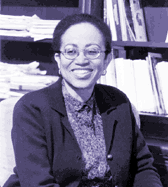Dr. Lula Beatty Commended by Historically Black Colleges

Dr. Lula Beatty, NIDA's chief of special populations, was honored with an "Enduring Contributions in the Interest of Science Award" at the Lonnie E. Mitchell National Historically Black Colleges and Universities (HBCUs) Substance Abuse Conference in Baltimore this spring. Dr. Edward G. Singleton of Howard University presented the award, noting Dr. Beatty's efforts to expand opportunities for special populations by promoting the significance of culture, ethnicity, gender, and equity and the need for sensitivity to these issues in the field of drug abuse.
At NIDA, Dr. Beatty administers minority research programs, develops initiatives to encourage greater participation by under-represented scholars in NIDA's research programs, and promotes and monitors the Institute's involvement in assessing the needs of special populations.
The Lonnie E. Mitchell Conference, held annually, is named in honor of the late Dr. Mitchell, an educator, policy advisor, and psychotherapist who worked extensively in community mental health, human services, and drug abuse prevention programs. Dr. Mitchell also served as chief of NIDA's Prevention and Education Branch during his career.
For this year's conference, Dr. Beatty provided technical assistance to the planning committee, spoke to children at the Youth Science Fair, and served as a panelist on public policy.
Teaching Community Leaders Strategies to Reduce Drug Abuse
NIDA representatives and 35 graduates of the Join Together National Fellows Program gathered in June for a 3-day "think tank" on how community leaders can use NIDA research in strategies to reduce drug abuse. Join Together is a Boston University-based organization that supports community efforts to reduce, prevent, and treat substance abuse across the Nation. The Fellows, local leaders recognized for their contributions to reducing drug abuse and its consequences, represented seven of the largest U.S. cities-Baltimore, Chicago, Cleveland, Detroit, New York, San Antonio, and San Francisco.
With participating Fellows serving as coteachers as well as students, the Institute aimed to increase participants' understanding of emerging scientific knowledge about prevention and treatment of drug abuse, to identify concrete steps for applying that knowledge, and to develop strategies for disseminating scientific information and dispelling myths about drug abuse and addiction.
NIDA Associate Director Dr. Timothy P. Condon and Dr. Jack B. Stein, deputy director of NIDA's Office of Science Policy and Communications, discussed the science of drug addiction, the principles of drug abuse prevention, and the efficacy of treatment for drug abuse. Dr. Charlene Woodard, a former NIDA policy analyst, coached participants in critical thinking about science in the news.
NIDA Seeks Applications for Clinical Trials Network
NIDA has issued a request for applications (RFA) to invite qualified investigators to participate in the National Drug Abuse Treatment Clinical Trials Network (CTN). The Institute has set aside $11 million for up to five awards for a project period of five years.
Based on a model used successfully by other NIH institutes, the CTN is designed to speed the application of new science-based treatments in real-life treatment settings. The central component of the CTN is a consortium consisting of a research institution and several allied community treatment programs. Each CTN consortium will work in concert to deliver and test an array of behavioral and pharmacological treatments and determine conditions under which new science-based treatments are successfully adapted. Most studies to be conducted will span multiple sites, populations, and geographic regions. Each community treatment program is expected to be a full partner in decision making about the research directions and activities of its consortium.
The first five CTN grants were awarded in September 1999 to research-and-treatment consortia centered in Connecticut, Pennsylvania, Baltimore and Virginia, California, and Oregon. With this next round of grants, NIDA hopes to extend the geographical coverage of the CTN to additional areas of the country.
